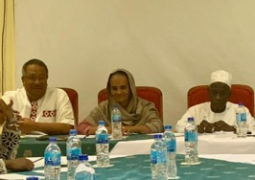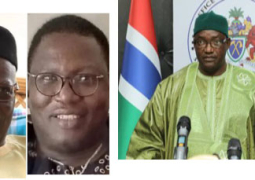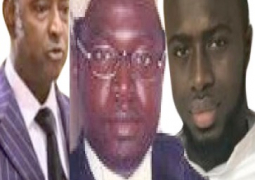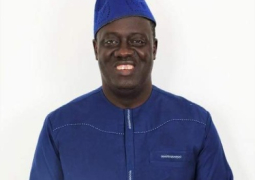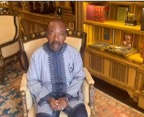
Speaking from what he said was his residence, he urged supporters to "raise your voice".
Earlier, army officers appeared on TV to say they had taken power.
They said they were annulling the results of Saturday's election in which Mr Bongo was declared the winner but the opposition said was fraudulent.
The officers also said they had arrested one of Mr Bongo's sons for treason.
Mr Bongo's overthrow would end his family's 55-year hold on power in Gabon.
The country is one of Africa's major oil producers, while nearly 90% of it is covered by forests. It joined the Commonwealth in June 2022, becoming one of the group's few members not to have been a British colony.
In his video message, Mr Bongo confirmed he was under house arrest.
"My son is somewhere, my wife is in another place... Nothing is happening. I don't know what is going on," he said in English, before again asking for help.
A communications company that was working for the presidency during the election has been in contact with the BBC to confirm the authenticity of the footage. It said it had been asked by Mr Bongo's office to circulate the video.
In their TV statement the coup leaders said they were cancelling the results of the election and dissolving "all the institutions of the republic".
It came after Gabon's electoral commission said Mr Bongo had won just under two-thirds of the votes in Saturday's election, which the opposition argued was fraudulent.
One of the soldiers said they had "put an end to the current regime" because of "irresponsible, unpredictable governance resulting in a continuing deterioration in social cohesion that risks leading the country into chaos".
Mr Bongo would be replaced by the head of the presidential guard, Gen Brice Oligui Nguema, and that certain officials would "answer for their actions" following an investigation.
The country's borders had been closed "until further notice", they added.
This is the eighth coup in former French colonies in Africa in the past three years.
However, most of the others have been further north, in the Sahel region, where an Islamist insurgency has led to rising complaints that the democratically elected governments were failing to protect the civilian populations.
In Gabon there is no doubt that having been in power since 1967, many have had enough of the Bongo family dynasty. People were quick to take to the streets, appearing to be genuinely delighted. So far there is little sign of a pushback.
The French government has condemned the takeover, with a spokesman calling for the election results to be respected.
However, French influence in Africa has waned significantly in recent years, and a call for yet more years of Ali Bongo is unlikely to go down well.
Indeed the military may have seen French power ebbing and felt empowered to step in as a result, with Paris less likely to act in support of Mr Bongo.
Mr Bongo's use of English in his video, rather than French which is Gabon's official language, suggests he was addressing the Commonwealth rather than France.
Russia and China are among the other countries that have expressed their concern. The European Union's foreign policy chief said a military takeover would increase instability in Africa.
"This is a big issue for Europe," said Josep Borrell.
Internet access was suspended following Saturday's election for security reasons, but was restored shortly after the apparent takeover. A curfew is also in place.
As in previous general elections in Gabon, there were serious concerns about the process in Saturday's vote.
Main opposition candidate Albert Ondo Ossa complained that many polling stations lacked ballot papers bearing his name, while the coalition he represents said the names of some of those who had withdrawn from the presidential race had still been on the ballot sheet.
Campaign group Reporters Without Borders said foreign media had been banned from setting foot in the country to cover the vote.
Both of Mr Bongo's previous wins were disputed as fraudulent by opponents. This time, controversial changes were made to voting papers just weeks before election day.
Mr Bongo came to power when his father Omar died in 2009.
In 2018, he suffered a stroke which sidelined him for almost a year and led to calls for him to step aside.
The following year, a failed coup attempt saw mutinying soldiers sent to prison.
Source: BBC


